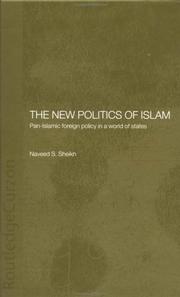| Listing 1 - 2 of 2 |
Sort by
|

ISBN: 0700715924 1135789762 1280070536 0203220331 9780203220337 9780700715923 9781135789763 9781280070532 9781135789718 9781135789756 9780415444538 1135789754 Year: 2003 Publisher: London New York RoutledgeCurzon
Abstract | Keywords | Export | Availability | Bookmark
 Loading...
Loading...Choose an application
- Reference Manager
- EndNote
- RefWorks (Direct export to RefWorks)
This text examines how Islam is to be understood in relation to contemporary international relations. It highlights salient characteristics in pan-Islamic theory and its implications.
Panislamism. --- Islam and politics --- Islam and international relations --- Panislamisme --- Islam et politique --- Islam et relations internationales --- Organisation of Islamic Conference --- Islamic countries --- Pays musulmans --- Politics and government. --- Politique et gouvernement --- Panislamism --- Politics and government --- Organisation of Islamic Conference. --- Pan-Islamism --- Islamic Conference Organisation --- Organisation of the Islamic Conference --- Organisasi Konperensi Islam --- Organization of the Islamic Conference --- Munaẓẓamat al-Muʼtamar al-Islāmī --- OIC (Organization) --- O.I.C. (Organization) --- Organisation de la Conférence islamique --- İslâm Konferansı Teşkilatı --- Pertubuhan Persidangan Islam --- Organisation der Islamischen Konferenz --- Organization of Islamic Conference --- OCI (Organization) --- Sāzmān-i Kunfirāns-i Islāmī --- منظمة المؤتمر الاسلامي --- OKI (Organization) --- Organizat︠s︡ii︠a︡ Islamskai︠a︡ Konferent︠s︡ii︠a︡ --- OIK (Organization) --- Arabism --- Organisation of Islamic Cooperation --- Islam and politics - Islamic countries --- Islamic countries - Politics and government
Book
ISBN: 0812251199 0812295943 Year: 2019 Publisher: Philadelphia : University of Pennsylvania Press,
Abstract | Keywords | Export | Availability | Bookmark
 Loading...
Loading...Choose an application
- Reference Manager
- EndNote
- RefWorks (Direct export to RefWorks)
Established in 1969, the Organization of Islamic Cooperation (OIC) is an intergovernmental organization the purpose of which is the strengthening of solidarity among Muslims. Headquartered in Jeddah, the OIC today consists of fifty seven states from the Middle East, Asia, Africa, and Latin America. The OIC's longevity and geographic reach, combined with its self-proclaimed role as the United Nations of the Muslim world, raise certain expectations as to its role in global human rights politics. However, to date, these hopes have been unfulfilled. The Organization of Islamic Cooperation and Human Rights sets out to demonstrate the potential and shortcomings of the OIC and the obstacles on the paths it has navigated.Historically, the OIC has had a complicated relationship with the international human rights regime. Palestinian self-determination was an important catalyst for the founding of the OIC, but the OIC did not develop a comprehensive human rights approach in its first decades. In fact, human rights issues were rarely, if at all, mentioned at the organization's summits or annual conferences of foreign ministers. Instead, the OIC tended to focus on protecting Islamic holy sites and strengthening economic cooperation among member states. As other international and regional organizations expanded the international human rights system in the 1990s, the OIC began to pay greater attention to human rights, although not always in a manner that aligned with Western conceptions.This volume provides essential empirical and theoretical insights into OIC practices, contemporary challenges to human rights, intergovernmental organizations, and global Islam. Essays by some of the world's leading scholars examine the OIC's human rights activities at different levels-in the UN, the organization's own institutions, and at the member-state level-and assess different aspects of the OIC's approach, identifying priority areas of involvement and underlying conceptions of human rights.Contributors: Hirah Azhar, Mashood A. Baderin, Anthony Tirado Chase, Ioana Cismas, Moataz El Fegiery, Turan Kayaoglu, Martin Lestra, Ann Elizabeth Mayer, Mahmood Monshipouri, Marie Juul Petersen, Zeynep Şahin-Mencütek, Heiní Skorini, M. Evren Tok.
Human rights --- Human rights. --- Human Rights. --- Law. --- Political Science. --- Public Policy. --- Religion. --- Religious Studies. --- POLITICAL SCIENCE / Human Rights. --- Basic rights --- Civil rights (International law) --- Rights, Human --- Rights of man --- Human security --- Transitional justice --- Truth commissions --- International cooperation. --- Law and legislation --- Organisation of Islamic Cooperation. --- OIC (Organization) --- OCI (Organization) --- Organisation de coopération islamique --- Organization for Islamic Cooperation --- Organisation for Islamic Cooperation --- Organization of Islamic Cooperation --- Organisation of the Islamic Cooperation --- Organization of the Islamic Cooperation --- ʻŌ̜ngkān Khwāmrūammư̄ ʻItsalām --- ʼAccalāmʻ Ññhi nhuiṅʻʺ Choṅʻ rvakʻ reʺ ʼA phvaiʹ khyupʻ --- Organisation of Islamic Conference --- Munaẓẓamat al-Taʻāwun al-Islāmī --- منظمة التعاون الإسلامي --- İslam İşbirliği Teşkilatı
| Listing 1 - 2 of 2 |
Sort by
|

 Search
Search Feedback
Feedback About UniCat
About UniCat  Help
Help News
News